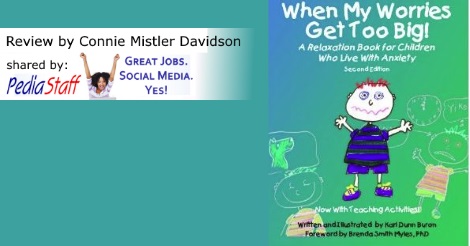Book Review: When My Worries Get Too Big

Review by: Connie Mistler Davidson via Amazon.com
How many kids do you know with Attention Deficit Disorder who don’t live with anxiety? I know very few. Anxiety and ADD go hand-in-hand for many children, especially in the classroom. The National Association on Mental Illness stated that, “According to a 2008 NIMH-supported study, over 30 percent of children living with ADHD also live with anxiety.”
Anxiety in the school setting doesn’t help the child with Attention Deficit Disorder. It makes them look unmotivated, since they are anxious about turning in a substandard assignment. Often, they don’t turn in assignments and get into trouble. This can lead to absences at school or the child becoming defiant. Anxiety needs to be dealt with for the child to work effectively in school. Starting early can help, since the young child does not have years of anxious failure to work through.
There is a new tool in the fight against anxiety in young children who have psychological differences. Kari Dunn Buron has written and illustrated a book titled When My Worries Get Too Big! A Relaxation Book for Children Who Live with Anxiety. Kari Buron has taught special needs students for more than thirty years and is a member of the Illinois State University Hall of Fame. The book has a Foreword by Brenda Smith Myles, PhD. When My Worries Get Too Big! A Relaxation Book for Children Who Live with Anxiety is designed to teach children to assess their anxiety level and to follow up by self-regulating those anxious feelings.
Using psychoeducation and cognitive behavior management, this book which melds a story book approach with a workbook format, teaches kids how to recognize anxiety. They learn strategies for lowering anxious feelings and returning themselves to a state of relaxation. The book uses a five point scale to assess anxiety. A one is relaxed and feeling good. A five is where the child is feeling like screaming and hitting. There is also a calming sequence and a calming strategy to help the child reduce anxiety and return to a calm state of being.
When My Worries Get Too Big! A Relaxation Book for Children Who Live with Anxiety begins with a child identifying those activities that they are good at. It equates knowing what is going on in their world to the feelings of being at level one or two. The physical symptoms of worry are explored. The child is taught that they can do something about the worry. Worry is not something that needs to escalate to a level five. A child can be in charge of his feelings. The calming sequence is introduced. At each step of the sequence, the child is told how the anxious state is improving. Then, they are prompted to show some personal actions that help them calm down. After that, they list worries. Children list the physical manifestations of the worries at each of the five levels on the five-point scale. After that, they fill in their individualized scales and how they can make each level better. The last part of the book lists six evidence-based strategies that can help extremely anxious children. A reference section is included.
The strategies from this excellent book can be used in all settings. It can be inconspicuously implemented in a general education classroom, a learning center, or at home. The scale and strategies are easy to use. If you know a child with Attention Deficit Disorder and anxiety, this book may be useful to help that child avoid years of anxiety, academic problems, and social isolation at school!
This is a review of the Second Edition. Much of what is written here also applies to the First Edition from 2006. A copy of the book was provided for review by AAPC Publishing. I was not compensated in any way for this review.
PediaStaff is Hiring!
All JobsPediaStaff hires pediatric and school-based professionals nationwide for contract assignments of 2 to 12 months. We also help clinics, hospitals, schools, and home health agencies to find and hire these professionals directly. We work with Speech-Language Pathologists, Occupational and Physical Therapists, School Psychologists, and others in pediatric therapy and education.
